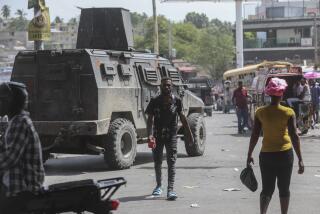U.N. to Launch Mission in Yugoslavia on Sunday : Peacekeeping: Special envoy Cyrus Vance says new violence won’t bar the ‘Blue Helmets.’
- Share via
SARAJEVO, Yugoslavia — United Nations peacekeeping troops will plunge into the tense, heavily armed conflict areas of Yugoslavia next week, despite obstacles and new outbreaks of violence, U.N. special envoy Cyrus R. Vance announced after a visit here Thursday.
Vance, who was secretary of state during the Carter Administration and who is now overseeing U.N. efforts to end eight months of civil war in Yugoslavia, declared after shuttling among rival leaders that tensions are high but that U.N. intervention is not in jeopardy. “You can ignore the suggestions that in some way we are not going to go forward,” he told reporters after talks with Bosnian President Alija Izetbegovic. “We are going to go forward.”
Top commanders of the force will arrive on Sunday, and as many as 400 soldiers will be dispatched to the crisis areas daily until the U.N. presence reaches its full 14,000-troop strength around mid-April, Vance said.
The people of Bosnia-Herzegovina, the latest Yugoslav republic to declare independence and spark a revolt by militant Serbs, had grown fearful of further delays in U.N. deployment because of clashes that have taken at least eight lives since their weekend referendum endorsing secession.
In a concerted effort to denounce the extremist actions that threatened the republic with civil war, tens of thousands staged peace demonstrations in Bosnian cities Thursday, including a sun-splashed rally by more than 20,000 in Sarajevo. It was the largest anti-war action in Yugoslavia since fighting broke out last June.
U.N. Security Council members unanimously approved a peacekeeping force for Yugoslavia two weeks ago, but concerns about the mission’s $634-million annual price tag put off its start.
Yugoslavia’s battle-weary peoples had been pinning their hopes on swift U.N. action to end the combat that has taken more than 10,000 lives; the administrative foot-dragging caused many to worry that the U.N. was stymied over how to go about its daunting task.
All sides in the confrontation are heavily armed and have ignored earlier orders of the federal leadership to turn weapons over to the Serbian-controlled Yugoslav People’s Army. Renegade warlords, like Milan Babic, who holds sway over militant Serbs in Croatia’s Krajina area, have also indicated that they will resist the U.N. deployment.
Serbian guerrilla units and some factions of the federal army have taken control of about one-third of Croatian territory. Croatian national guardsmen are armed and positioned to launch retaliatory raids to recover the areas. But they have been restrained by a Jan. 3 cease-fire and the United Nations’ promise to move in and restore order.
U.N. mediators had originally sought to have the rival paramilitary groups disarmed before the world group’s “Blue Helmets” arrived. But they have apparently discarded those hopes and agreed to undertake the dangerous task themselves.
Asked if he expects disarmament of fighters in the three designated U.N. Protected Areas in Croatia before the U.N. troops arrive, Vance said simply, “No.”
“The peacekeeping forces will do the disarming,” said Herbert Okun, Vance’s assistant in the Yugoslav mission.
Vance said the recent violence in Bosnia was no grounds for second thoughts about making Sarajevo the mission’s headquarters or Serb-controlled Banja Luka the logistics center of the peacekeeping force. “It is terribly important that restraint is exercised on all sides and that the situation is not allowed to get out of hand,” he said.
Izetbegovic, the Muslim president of this volatile, multi-ethnic republic, praised the imminent U.N. arrival as a deterrent to further ethnic confrontation. He said he was told by Vance that the federal army appears to be changing its role in the Yugoslav conflict, suggesting it may not step in to fight alongside rebellious Serbs in Bosnia, as it did in neighboring Croatia.
Bosnia, a republic of 4.4 million, is now occupied by 150,000 federal troops, despite having formally seceded from the crumbling Yugoslav federation. Many more are expected to arrive from Croatia once the federal army withdrawal, mandated by the U.N. deployment plan, gets under way, presumably next week.
The huge military presence makes many here nervous. But Sarajevo officials say they must move cautiously in reducing the army’s size or redefining its role. The war has impoverished the entire federation, making it impossible for demobilized soldiers to find jobs, and many come from areas where homes have been destroyed by battle.
Radovan Karadzic, the political leader of Serbs in Bosnia, earlier Thursday urged the army to take control of Bosnia. But the commander of the regional army district has said his troops will not intervene.
Karadzic, whose Serbian Democratic Party sided with armed vigilantes who paralyzed Sarajevo with barricades earlier this week, has been warning of civil war in the republic, unless the leadership backs away from independence.
More to Read
Sign up for Essential California
The most important California stories and recommendations in your inbox every morning.
You may occasionally receive promotional content from the Los Angeles Times.














